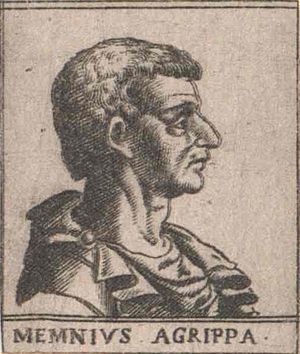Agrippa Menenius Lanatus (consul 503 BC) facts for kids
Quick facts for kids
Agrippa Menenius Lanatus
|
|
|---|---|
 |
|
| Consul of the Roman Republic | |
| In office 1 September 503 BC – 29 August 502 BC Serving with Publius Postumius Tubertus
|
|
| Preceded by | Publius Valerius Publicola, Titus Lucretius Tricipitinus |
| Succeeded by | Opiter Verginius Tricostus (consul 502 BC), Spurius Cassius Vecellinus |
| Personal details | |
| Born | Unknown Ancient Rome |
| Died | 493 BC Ancient Rome |
| Children | Titus Menenius Lanatus, Agrippa Menenius T. f. Agrippae n. Lanatus |
Agrippa Menenius Lanatus (died 493 BC) was an important leader in the Roman Republic around 500 BC. He served as a consul in 503 BC, which was like being one of the top elected officials in ancient Rome. His partner in this role was Publius Postumius Tubertus.
Menenius was a successful military leader. He won a big victory against the Sabines, a neighboring group of people. Because of this win, he was given a special parade called a triumph on April 4, 503 BC. He also led Roman soldiers in a fight against the Latin town of Pometia. Some old stories say that he and his fellow consul also helped count the Roman citizens in a census during their time in office.
Contents
The Fable of the Body Parts
Agrippa Menenius Lanatus is most famous for a story he told to help solve a big problem in Rome. In 494 BC, the common people of Rome, known as the plebs, were very unhappy. They felt they were not treated fairly by the powerful, wealthy families, called the patricians. The plebs decided to leave Rome and go on a "strike," refusing to work or fight for the city. This event is known as the secession of the plebs.
The patricians chose Menenius to talk to the plebs and convince them to come back. He told them a clever fable about the parts of the human body. In his story, the other body parts thought the stomach was lazy because it just sat there and received all the food. So, they decided to stop working to feed the stomach.
Soon, the arms, legs, and brain became weak and tired. They realized that the stomach was actually very important because it digested the food and sent energy to all the other parts. Without the stomach, the whole body couldn't work.
In this fable, the stomach represented the patrician class, and the other body parts represented the plebs. Menenius used this story to show that both groups needed each other for Rome to be strong and healthy.
A New Office for the People
After Menenius told his fable, the patricians and plebs reached an agreement. To protect the rights of the common people, they created a new important job called the tribune of the plebs. These tribunes were officials chosen by the plebs to speak for them and protect them from unfair treatment by the patricians.
Menenius's Social Standing
There's an interesting question about Menenius: Was he a patrician or a plebeian? Some ancient writers said he was "dear to the plebeians as being one of themselves by birth." This would mean he was from the common people. However, he was sent by the Senate (which was mostly patricians) to talk to the plebs, and he had held the office of consul. At that time, the consulship was usually only for patricians.
This makes his social status a bit of a puzzle for historians. Ancient stories about early Roman history can sometimes be unclear or have different viewpoints. Modern scholars still discuss how exactly the "plebeian" and "patrician" groups worked in Rome's very early days.
Later Life and Legacy
Agrippa Menenius Lanatus died in 493 BC. Old Roman accounts say that both the Senate and the common people respected him, especially after he helped end the plebs' protest. When he died, his family didn't have enough money to pay for his funeral. So, the people of Rome, who admired him, collected money to pay for it themselves.
Menenius had a son who also became a consul in 439 BC. Agrippa Menenius Lanatus was also a character in a famous play by William Shakespeare called Coriolanus.
See also
 In Spanish: Agripa Menenio Lanato (cónsul 503 a. C.) para niños
In Spanish: Agripa Menenio Lanato (cónsul 503 a. C.) para niños
- Menenia gens
- Agrippa (disambiguation)
 | Kyle Baker |
 | Joseph Yoakum |
 | Laura Wheeler Waring |
 | Henry Ossawa Tanner |

